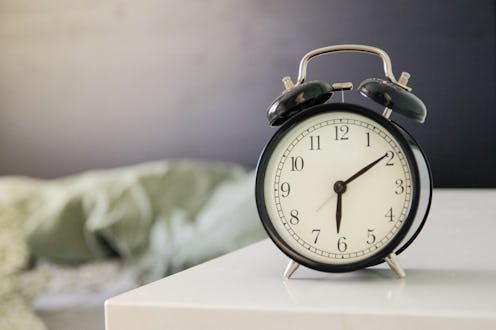
As obsolete as manually changing analog clocks has become — thank you, automatically adjusting smartphones! — there is still often a great deal of confusion surrounding that pesky little biannual practice we call Daylight Saving Time. Knowing when to change your clocks for Daylight Saving Time may not seem super important, especially when most digital timepieces make the jump without us even having to think about it. That being said, DST can be a little disorienting. And, this season we're losing an hour of sleep rather than gaining one (as the old saying goes, spring forward, fall back), so waking up in a groggy panic because you're not sure what time it actually is, for some of us, seems inevitable.
Each year, Daylight Saving Time falls on the second Sunday in March and the first Sunday in November. This month, that second Sunday just so happens to be March 13. At 2 a.m. Sunday morning, we will spring ahead one hour, meaning it is actually 3 a.m. So, if you have any clocks that need manual adjusting, or you're just paranoid that your smartphone will glitch and not get the memo that DST has arrived, the official time to change your clock would be at 2 a.m. Sunday. But, seeing as how the chances you'll be awake for that are slim, you can always do it the night before, or else just wait until morning. Personally, I fall into the "paranoid my phone is wrong" camp, and always end up frantically Googling "what time is it" on DST Sundays. It's pretty safe to say, though, that my phone has never been wrong. Technology is a beautiful thing.
So you've figured out this whole clock situation, but why do we have Daylight Saving Time in the first place? It's a practice that first came into effect in 1918, as a way to save energy and fuel during World War I. The idea was that DST would maximize daylight so that Americans wouldn't have to be so dependent on alternative light sources, and therefore would cut down on energy usage. In 1966, DST officially became a law when President Lyndon B. Johnson signed the Uniform Time Act. Only Hawaii and most of Arizona don't observe Daylight Saving Time in the United States.
While there's no arguing that an extra hour of sunlight at the end of the day can feel like an amazing thing, especially when coming off a long, cold and dark winter, not everyone is on team DST. For one thing, we're losing an hour of sleep, which is never something to look forward to. And, as one recent study from Indiana shows, Daylight Savings actually led to a 1 percent increase in the amount of energy consumed, rendering DST's original mission moot.
That being said, it doesn't look like DST is going anywhere soon, so the best we can do is mentally prepare ourselves to sluggishly get through Sunday as the sleep-deprived zombies that we are, and then look forward to the extra hour of daylight that awaits us. After all, Daylight Saving Time might be annoying, but it's as sure a sign as any that summer is finally on its way.
Images: Kinga Krzeminska/Moment/Getty Images; Giphy